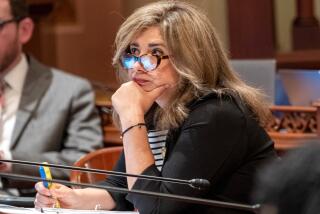California Sen. Tony Mendoza abruptly resigns, was facing expulsion after sexual harassment investigation

An investigation found he “more likely than not” sexually harassed several women
Reporting from Sacramento — Tony Mendoza, a former East Los Angeles elementary school teacher who moved swiftly from local to state government elected offices, resigned from the California Senate on Thursday just moments before his colleagues sought to formally expel him after a series of sexual misconduct accusations.
The resignation was the culmination of an almost three-month saga that saw the Artesia Democrat stridently deny any improper conduct while accusing his fellow legislators of unfair treatment. He becomes the third state legislator to resign in the wake of allegations that have shaken the state Capitol community.
Mendoza’s resignation was announced minutes before senators were poised to consider a debate on either expelling him or suspending him without pay for the rest of the year.
He submitted a fiery resignation letter specifically taking aim at the actions of Senate President Pro Tem Kevin de León (D-Los Angeles), who Mendoza said “will not rest until he has my head on a platter to convince the MeToo movement of his ‘sincerity’ in supporting the MeToo cause.”
Mendoza’s letter also left open the possibility that he might run again for his Los Angeles County seat in this year’s regular election.
Mendoza, 46, was first accused last fall of improper conduct with a woman in her early 20s serving as a Senate fellow in his Capitol office. Over the course of several weeks, other women made similar allegations — what an investigation ordered by the Senate Rules Committee described as a pattern of “unwanted flirtatious or sexually suggestive behavior.” Six women shared stories that spanned from 2007, when Mendoza served in the Assembly, through 2017.
In one allegation of an incident from 2008, Mendoza, who is married, was reported to have invited a 19-year-old intern to spend the night in an adjoining suite during a California Democratic Party convention. The investigation report included accusations that he “offered and subsequently had alcoholic drinks with the intern in the hotel suite.”
Ultimately, investigators concluded that the allegations were “more likely than not” to be valid.
“Although none of the women reported that Mendoza explicitly threatened them or offered career benefits in exchange for sexual favors,” the investigators wrote, “the subordinate employees believed that complaining about his conduct could put their careers at risk.”
Each senator was permitted this week to view the full investigative report, which was nearly 50 pages long and drew on interviews with 47 people and a review of hundreds of thousands of documents.
The internal debate over removing Mendoza from office, according to those familiar with the discussions, focused on the impropriety described in the report’s findings. Senators also considered Mendoza’s increasingly combative posture against the investigation, which he described as lacking due process.
Mendoza, whose Senate term was set to expire later this year, filed a lawsuit against the Senate last week arguing that his constituents have been unjustly denied representation.
Some lawmakers privately feared an expulsion would set a dangerous precedent, opening the door for more frequent use of the Legislature’s stiffest punishment. But there was also resolve in the final moments to take action.
“It was serious. It was thoughtful. It was painful. And it needed to be,” Sen. Toni Atkins (D-San Diego) said of the Democrats’ private deliberations. She soon will take over leadership of the Senate as De León terms out of office.
Have you experienced sexual harassment in government or politics? Please share your story »
Four of the women who made accusations worked for Mendoza as staffers, interns or fellows; a fifth woman worked for a different legislator and another worked as a lobbyist. The report said that none found him to be physically aggressive or sexually crude but that all understood him to be seeking sexual contact. Democrats debated disciplinary action in an hours-long closed-door meeting Wednesday, weighing punishments that ranged in severity from a formal censure to suspension with or without pay to expulsion.
On Wednesday, Mendoza sent his Senate colleagues a three-page letter in which he teetered between anger and atonement over the allegations and the ensuing investigation.
“I was deeply disconcerted when reviewing the investigation summary,” he wrote. “Though the summarized findings do not comport with my recollection or perception of the events described, I am immensely sorry if my words or actions ever made anyone uncomfortable.”
Mendoza was not present in the state Capitol on Thursday. News of his decision came so suddenly that there was initial confusion over whether he was indeed resigning or simply threatening to do so.
The mood among Senate Democrats palpably lightened once they realized they would not have to undertake a contentious expulsion vote. Sen. Bill Monning (D-Carmel) distributed copies of Mendoza’s resignation letter on the Senate floor, dryly telling colleagues it was “for your scrapbook.”
Sen. Steve Glazer (D-Orinda) said he was pleased Mendoza submitted his resignation.
“I think that he has the choice now of going to his voters and making the case of why he deserves to hold the office,” he said.
Formal reprimands by the Legislature are exceedingly rare. No lawmaker has been censured since 1982, when a Republican senator from Newport Beach was rebuked for calling abortion rights advocates “bull dykes” during a Los Angeles event. The last expulsion was far earlier, when four senators were removed in 1905 for accepting bribes. Two of those senators later served time in prison for the crimes.
Mendoza could have been suspended by the Senate, either with or without pay. In 2016, voters approved a state constitutional amendment allowing for the no-pay option — a change sparked by criminal charges in 2014 against three Democratic senators. Two of those lawmakers — former state Sens. Ron Calderon of Montebello and Leland Yee of San Francisco — later pleaded guilty to corruption charges. The third, former Inglewood state Sen. Roderick Wright, was convicted of perjury and voter fraud.
All three men continued to earn a state paycheck while suspended. Proposition 50 made clear that a lawmaker who was suspended could also be stripped of salary and per-diem travel payments.
Sen. Joel Anderson (R-Alpine) said Thursday that if expulsion wasn’t merited against the three senators in 2014, it wasn’t appropriate in the case of Mendoza.
“Now we have somebody who has been accused of something, who hasn’t been found guilty of anything, not a crime,” he said. “And yet, we’re talking about expelling that member. So the penalty of being accused of something is greater than being found guilty of eight felonies.”
But other Republicans were early advocates for expelling Mendoza, proposing the action as soon as lawmakers reconvened in early January. That movement prompted Mendoza to voluntarily take a monthlong paid leave. The Senate voted later that month to extend the leave of absence, during which Mendoza has been receiving his annual $107,238 salary.
The series of events surrounding Mendoza presented a political quandary for a number of lawmakers — most notably for De León as he mounts an insurgent campaign against a fellow Democrat, U.S. Sen. Dianne Feinstein. The state Senate leader once rented a room in Mendoza’s suburban Sacramento home, a living arrangement he quickly dissolved once the allegations surfaced last November.
One other lawmaker, Assemblywoman Cristina Garcia (D-Bell Gardens), is also on official leave after being accused of improper actions by a former legislative staffer and a lobbyist. She and Mendoza represent neighboring legislative districts in southeastern Los Angeles County, including several communities that overlap. While the Garcia investigation remains underway, Mendoza’s departure means that about 440,000 residents will continue to lack an elected voice in the halls of the state Capitol.
Multiple legislators have been stung by sexual misconduct controversies in the wake of the #MeToo movement and an open letter signed in October by more than 140 women decrying a “pervasive” culture of sexual harassment in California politics. Two Assembly members, Raul Bocanegra (D-Pacoima) and Matt Dababneh (D-Woodland Hills), resigned after multiple accusations of unwanted sexual advances, which both men deny.
An investigation continues into other legislators, including Sen. Bob Hertzberg (D-Van Nuys), who has been accused of giving unwanted hugs. Most, however, have not been publicly identified. This month, the two legislative houses released dozens of documents telling of sexual harassment complaints that had been substantiated since 2006.
It is unclear when a special election to fill Mendoza’s Senate seat would be held, but some election lawyers were suggesting Thursday that someone could be elected in late summer to serve in the seat until November — even though the Legislature is in recess at the time.
As many as four Democrats have said they intended to challenge Mendoza for the four-year term that begins in early December.
Times staff writer Jazmine Ulloa contributed to this report.
Follow @johnmyers and @melmason on Twitter, sign up for our daily Essential Politics newsletter and listen to the weekly California Politics Podcast
ALSO
Updates on California politics
UPDATES:
2:45 p.m.: This article was updated throughout with additional details on the investigation into Mendoza and reaction from other legislators.
This article was originally published at 11:55 a.m.
More to Read
Get the L.A. Times Politics newsletter
Deeply reported insights into legislation, politics and policy from Sacramento, Washington and beyond. In your inbox three times per week.
You may occasionally receive promotional content from the Los Angeles Times.












